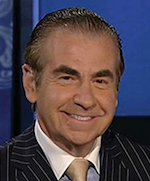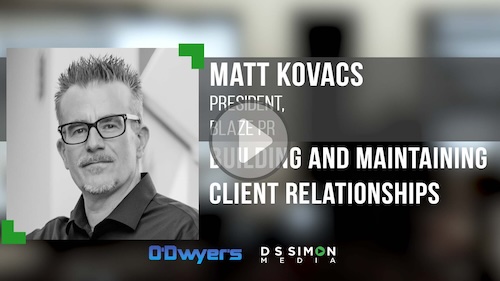 |
| Fraser Seitel |
In July, as Jeff Bezos and his three stalwart space co-travelers drifted to a soft landing in the desert from 66 miles up, Bloomberg reporters on the scene in Van Horn, Texas pondered the question on everyone’s mind.
“I wonder,” said the lead anchor, “who will be the first person out of the capsule?”
“My bet,” said her co-anchor, “is that the Amazon founder says ‘ladies first’ and invites female aviation pioneer Mary Wallace ‘Wally’ Funk to be first off.”
Wrong. A few earthbound minutes later, the hatch door opened and out stepped the $200 billion man, no doubt leaving fellow astronaut Wally in a bit of a “funk.” No pretend chivalry would get in the way of Bezos’ moment in the sun.
In purposely choosing to precede all others off the space vessel, the outgoing Amazon CEO was tacitly communicating that he, above all others, was responsible for this particular “leap.”
Such communication—strong, confident, self-assured—is required of a CEO or any executive, who is also “leader.” True “leadership” is different than “managing” or being the “top man or woman” or exercising “power.”
Many in positions of power today lack the communications requisites to qualify as a “leader.” Here are three key communications requisites and the grades today’s so-called “leaders” would merit.
| This article is featured in O'Dwyer's Aug. '21 Financial PR/IR & Professional Services PR Magazine (view PDF version) |
Leadership communications requires courage.
A leader must be willing to communicate with conviction, resoluteness, to stick his or her neck out with the courage of their convictions.
Leaders must stand for something and have the chutzpah to tell people what they stand for. They must convey the courage to offer solutions which may not please everyone.
For example, in Bezos’ case, his flight was roundly criticized before, during and after his 10-minute jaunt into space by conservatives and liberals alike as a spectacular waste of money, a billionaire’s ludicrous flight of fancy that served little earthly purpose. Bezos, critics charged, should pay more attention to the working conditions and pay Amazon facilities.
But the Amazon impresario never relented, explaining thoughtfully at his post-flight news conference how this was the first step in a journey that would help yield answers to the earth’s climate change crisis. In that meeting with reporters, the notoriously press-shy Bezos demonstrated not only a credible rationale for his trip and its expense but also a sense of commitment rarely found among easy-to-hate billionaires.
Compare that experience with that of fellow billionaire Mark Zuckerberg, who despite arduous public relations coaching to improve his “people skills,” still appears wooden, rehearsed and unconvincing in his public appearances. With the Facebook CEO, on topics from privacy to censorship, the words may be there, but the courage of commitment isn’t. Thus in terms of communications leadership: Bezos = B; Zuckerberg = C-.
Leadership communications requires knowledge.
Even a leader who communicates courageously must have the knowledge to back up his or her words. Most people aren’t that stupid; they can tell if you’re a phony.
“Empty suit” is an apt description for a leader who may speak eloquently but fails miserably when forced to substantiate his/her comments with proof or action. True leaders are smart enough to understand that communications is a means to an end, not an end to itself. In other words, a true leader will speak from knowledge and use their words to incite desired action.
Biden Treasury Secretary Janet Yellen is a sterling example. She speaks plainly; she’s from Brooklyn; she’s everybody’s favorite grandma. But when Janet Yellen talks “economics,” people listen … and follow. There’s a reason the UCal-Berkley-trained economist was the first female Federal Reserve Chair and U.S. Treasury Secretary. She’s smart, and even Republicans rarely question her arguments for child tax credits, universal corporate tax rates and similar controversial policies.
Yellen’s colleague Homeland Secretary Alejandro Mayorkas is her polar opposite. Mayorkas, of course, has the unenviable task of controlling the flow of immigrants into the U.S. Few argue that the non-stop cascade of immigrants at the southern border has become the Biden Administration’s greatest problem. And Mayorkas, particularly in testimony before Congress, has just made things worse, mostly echoing platitudes, tip-toeing past loaded words like “crisis” and mostly declaring how hard he and his staff work. The point: While Yellen is respected, Mayorkas is doubted.
And then consider the examples of New Jersey Senator Cory Booker and South Carolina Congressman James Clyburn. Both, by all accounts, are nice guys, well-liked by their colleagues and Washington lifers. But the former speaks to be noticed, while the latter speaks to get things done.
With few accomplishments to point to as either a mayor or senator, the ever-available Booker is probably most associated with his self-acknowledged “Spartacus moment” evisceration of Supreme Court Justice-to-be Brett Kavanaugh over sexual harassment charges when Kavanaugh was in high school. Booker’s dramatic televised performance at the Kavanaugh hearings, which had virtually no impact on the outcome, nonetheless earned him reverence in progressive circles and millions in campaign contributions.
Clyburn, on the other hand, although in the Congress for three decades, is much less “available” to the media and picks his public shots carefully. He’s probably most famous for stepping up to speak in behalf of a faltering Joe Biden in the 2020 South Carolina presidential primary, which resulted in reversing the candidate’s fortunes and paving the way for his presidency. Guess who carries more influence in Washington?
Ergo, in terms of communications leadership: Yellen = A; Clyburn = A; Mayorkas = D; Booker = D.
Leadership communications requires humanity.
A communications leader must also persuade through moral leadership. No amount of courage or knowledge will be enough to convince most people to follow without a concomitant sense of humanity.
Whenever they communicate, leaders must think first of “people” and what impact their words will have on them. In today’s climate of one-percenters, increased inequality and have’s vs. have-nots, few in our society will tolerate an unfeeling person in power. That’s why such individuals need public relations advisors to counsel them to “do the right thing.”
The NFL’s Bill Belichick and the NBA’s Greg Popovich, for example, are legendary coaches, who by most accounts have friends and give freely to charity. But both are also arrogant, self-important bullies, who terrorize meagerly-paid beat reporters whose job it is to interview them. Their hubris prevents either Belichick nor Popovich from seeking out more self-aware public relations counselors, and neither coach shows a shred of humanity. As a consequence, as good as they are as coaches, those who aren’t fans of their teams despise the demonic duo. Correctly.
Finally, in terms of humanity, there’s the recent ranking of 44 ex-Presidents by 142 historians. Barack Obama was ranked 10. Donald Trump was ranked 41. Obama may have been short on legislative accomplishments, but he was long on empathy and moral leadership. Trump, for better or worse, was America’s most influential leader in decades but morally tone-deaf, often uninformed, a serial fibber and an incontrovertible bully.
Communications leadership translation: Obama = B+; Belichick = D; Popovich = D; Trump = F.
***
Fraser P. Seitel has been a communications consultant, author and teacher for 40 years. He is author of the Pearson text “The Practice of Public Relations,” now in its 14th edition, and co-author of “Rethinking Reputation" and "Idea Wise.” He may be reached directly at [email protected].










 Have a comment? Send it to
Have a comment? Send it to 
Jul. 30, 2021, by Joe Honick
Reality: if some of the claimants in this communications industry want to demonstrate their qualifications for professional status, every one of them would dedicate a modest part of their budgets to helping get Americans vaccinated for the good of themselves, their clients and everyone else so exposed to the criminal misinformation that has endangered millions.